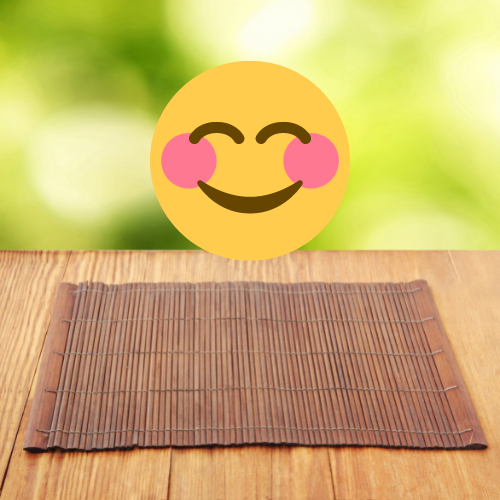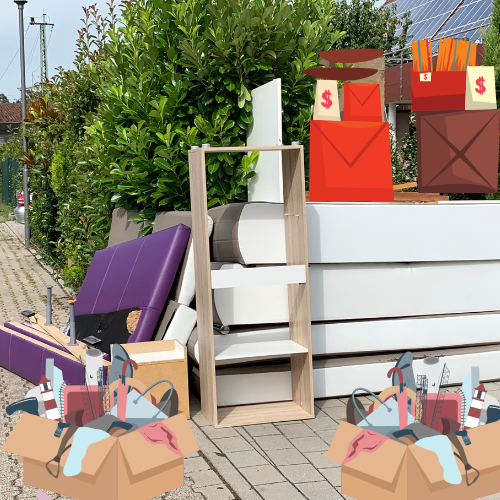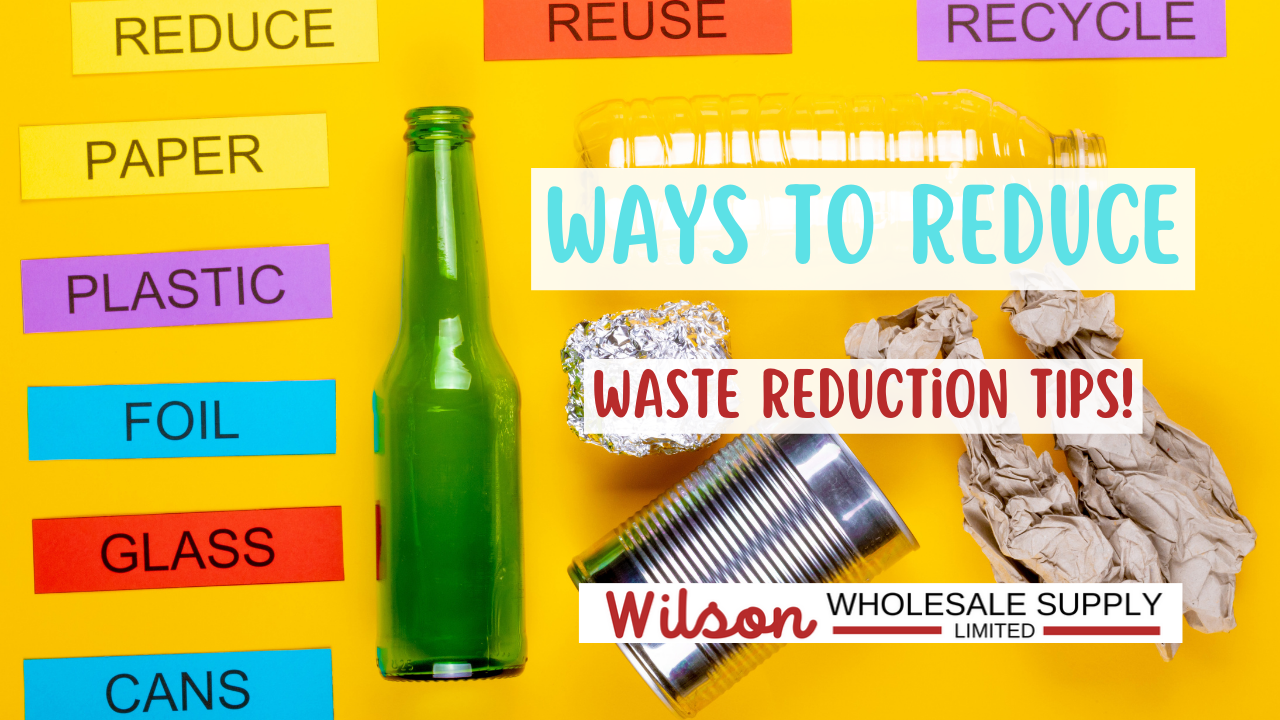6 Waste Reduction TIPS
So many decisions in our daily life are affecting our world. A typical household produces approximately 20 plus tons of garbage a year. Finding ways to make minor changes to improve the environment. You have seen eco-friendly reusable bags at the grocery store and wondered what they are all about. Or you have heard the term “waste reduction” but are unsure of what it means. Waste reduction is simply the process of reducing the amount of garbage that is produced. It can be accomplished in many ways, from food scraps to recyclable containers.
One way to reduce waste is to use an eco-friendly reusable bag instead of a single use bag. These sacks are made from materials that can be easily recycled or composted. They are also sturdier than a single use bags, so they can be used multiple times. Another way to reduce the amount of food wasted is to compost your scraps. This is a fantastic way to reduce landfill pile up and provide your plants with valuable nutrients. Finally, you can reduce packaging materials by choosing products that have less packaging or that can be refilled. By making minor changes like these, you can make a substantial difference in the amount of garbage that is produced.
1, Ditch disposables in the kitchen

Single use packaging is a great option, but these products can be quite expensive. Alternatively use a silicone baking sheet as an alternative to paper towels or parchment. When cleaning switch to a microfiber cloth for washing or transferring. Reusable containers and washable snack bags help you keep your food fresh and reduce your trash consumption throughout your home every day.
2, Say no to disposable water bottles and coffee cups

One way to reduce the amount of garbage you produce is to say no to disposable bottles and coffee cups. Even if you recycle them, these items still end up in the dumps. Plus, the manufacturing of plastic bottles creates a huge carbon footprint. The best way to stay hydrated on the go is with an eco-friendly reusable drinking bottle. Stainless steel is a great eco-friendly material. If you prefer hot drinks, invest in a reusable thermos coffee cup. These days you can find cups made from eco-friendly materials like bamboo and scrap paper. You can also find reusable straws made from eco-friendly materials like bamboo, stainless steel, and glass. So next time you’re reaching for a disposable bottle or coffee cup, think about the environment and choose an eco-friendly option instead.
3, Shop eco-friendly with reusable bags
With city-level restrictions on plastic bag distribution, the reusable grocery bag is now widespread in stores around Canada. They may also significantly reduce plastic garbage that is accumulated in dumps. You can purchase them from a variety of places, such as your local grocery stores or online. There’s no need to feel guilty the next time you forget your eco-friendly reusable shopping bags at home. These days, there are so many creative ways to reduce garbage, from organic waste to paper packaging. And one of the simplest ways to reduce your environmental footprint is to ditch the disposable sacks and switch to reusable grocery bags. Not only are eco-friendly reusable shopping bags better for the environment, they’re also better for your wallet. Over time, the cost of buying disposable sacks will add up, whereas eco-friendly reusable shopping bags can be used over and over again. So next time you’re at the store, make the switch to eco-friendly reusable shopping bags and start reducing your environmental impact today.
4, Lower Unnecessary waste
We live in a world that is increasingly full of waste, what we need is less waste or even zero waste. We can all dream. From textile waste to household waste to hazardous waste, it seems like there’s always something new being added to the landfill. And much of this waste is completely unnecessary.
Take, for example, the unfinished projects that we often leave behind. Whether it’s a half-finished scarf or a half-built bookshelf, these unfinished projects create a lot of garbage. Not only do they take up space in our homes, but they also require us to purchase new materials every time we start a new project.

The same is true of letting things pile up. When we let things like clothes and paperwork pile up, we create an inviting environment for pests and clutter. Not only does this make our lives more difficult, but it also creates more work for us in the long run. The good news is that there are ways to reduce garbage.
By taking some simple steps like recycling and composting, we can make a big difference in the amount of garbage we produce. And when it comes to unfinished projects and letting things pile up, a little bit of organization can go a long way. By taking the time to declutter our homes and finish our projects, we can greatly reduce the amount of garbage we produce.
5, Everyday products with a huge environmental impact
While some types of garbage are more obvious than others, there are many everyday products that have a huge impact on the environment.
For example, single-use items like plastic bottles and coffee cups create a lot of garbage. Even if you recycle them, these items still end up in landfill. Plus, the manufacturing of plastic bottles creates a huge carbon footprint. Drink containers and snack packs are not the only problem, however.
Disposable diapers are another major source of garbage. It is estimated that a baby will use up to 6,000 diapers in their first year alone. And while there are now eco-friendly options available, many disposable diapers still end up in landfills.
Paper towels and coffee filters are another common source of garbage. Though they may seem like they’re made of natural materials, towels and coffee filters are often lined with plastic. This means that they can’t be recycled and end up in landfill. Cloth napkins are a great alternative to disposable towels and coffee filters. Not only are they reusable, but they can also be washed and used again.
The good news is that there are alternatives to all these products. A reusable water bottle, personal metal straws, cloth diapers, and bamboo coffee filters are all great eco-friendly options. By making the switch to these products, you can greatly reduce your impact on the environment.
6, Reusable Bottles and Rechargeable Batteries

As we all know, disposable bottles and batteries are bad for the environment. They end up in landfill and take hundreds of years to decompose. The good news is that there are now eco-friendly alternatives available.
Personal drinking bottles and renewable batteries are two simple ways to reduce the amount of waste we produce every day. Personal water can be used over and over again, eliminating the need to buy new bottles or throw away plastic ones. renewable batteries can be used multiple times before they need to be recycled, which helps to reduce the need for disposable batteries. Both of these options save money and help to reduce the amount of waste that goes into landfills. In addition, using reusable bottles and renewable batteries helps to protect the environment by reducing the number of resources that are needed to produce new products. By making slight changes like these, we can all help to reduce the amount of waste we produce and make a positive impact on the environment.
Most plastic wrap is made from petroleum-based raw materials, which means it can’t be recycled. However, it can be reused. And, when film wrap is reused, it reduces the amount of waste that goes into landfills.
Use your own containers when packing a lunch, instead of using disposable plastic sacks. And, when cooking at home, use reusable containers to store leftovers rather than throwing away plastic wrap.
Summary
The average household produces over 20 tons of garbage a year. But, by recycling, composting, and decluttering, we can make a big difference in the amount of waste we produce. There are also many everyday products that have a huge impact on the environment. Disposable water bottles, coffee cups, paper towels, and diapers are all major sources of waste. However, there are now eco-friendly alternatives available for all of these products. By making small changes like using reusable water bottles and renewable batteries, we can all help to reduce the amount of waste we produce and make a positive impact on the environment.

FAQ
Q: What is waste reduction?
A: Waste reduction refers to the process of reducing the amount of waste generated by individuals, businesses, and organizations. It involves implementing measures to minimize waste at the source, reduce the use of materials and resources, reuse and recycle materials, and dispose of waste in an environmentally responsible manner.
Q: Why is waste reduction important?
A: Waste reduction is important for several reasons. First, it helps to conserve natural resources, reduce pollution, and protect the environment. Second, it can save money by reducing the costs associated with waste disposal and purchasing new materials. Third, it can promote sustainability and encourage responsible behavior among individuals, businesses, and organizations.
Q: What are some ways to reduce the amount of waste we produce?
A: There are many ways to reduce the amount of waste we produce. Some simple tips include recycling, composting, and decluttering our homes.
Q: What everyday products have a huge impact on the environment?
A: Some everyday products that have a huge impact on the environment include plastic bottles, coffee cups, disposable diapers, paper towels, and coffee filters.
Q: Are there eco-friendly alternatives to disposable products?
A: Yes, there are eco-friendly alternatives to many disposable products. Some examples include reusable water bottles, metal straws, cloth diapers, and bamboo coffee filters.
Q: How can I learn more about waste reduction?
A: There are many ways to learn more about waste reduction. One way is to read books or articles on the topic. You can also attend workshops or seminars, or even take online courses.
Q: You can also join a waste reduction group or community.
A: This will allow you to meet other people who are interested in reducing their waste, and you can learn tips and tricks from each other. Finally, you can always contact your local waste management department or solid waste authority to learn more about waste reduction opportunities in your area.
Q: What is the role of government in waste reduction?
A: Governments can play a crucial role in waste reduction by implementing policies and regulations that promote sustainable waste management practices. For example, governments can provide funding and support for recycling programs, promote waste reduction initiatives, and enforce laws and regulations related to waste disposal. Additionally, governments can encourage sustainable consumption habits among individuals and businesses by implementing policies such as eco-labelling and product stewardship programs.
Thank you for Checking out our blog – 6 Waste Reduction TIPS


0 Comments